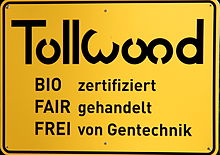

The Tollwood Festival is a festival which takes place semi-annually in the Olympiapark (summer) or on the Theresienwiese (winter) in Munich.


The Tollwood Festival is a festival which takes place semi-annually in the Olympiapark (summer) or on the Theresienwiese (winter) in Munich.

The first Tollwood Festival was held on the southern grounds of the Olympiapark in the summer of 1988. At the first Tollwood Festival from 1–11 July 1988, appearances were made by local artists such as Konstantin Wecker and Biermösl Blosn. Starting in 1991, more international artists participated. Since 1991, in addition to the summer festival the first winter festival was held, which since 2000 takes place on the Theresienwiese. In 1999, the winter festival suffered severe damages from a winter storm at its site on Arnulfstraße in late December.
Tollwood Festival is organized by the Tollwood GmbH. [1] The festival takes place on approximately 30,000-meter2 ground area. It has around 900,000 visitors in summer and in winter about 600,000. Financing is covered by approximately 40% from ticket sales, 40% of the rental income on stand operators and 20% from sponsors. Government grants are not included.
Special features of the festival were the marketplace of ideas, the ecological gastronomy festival and the cultural program of music, various forms of theater, performances and visual art. The festival featured a wide range of musical styles such as rock, singer-songwriters, jazz and blues. Furthermore, theatrical and artistic performances were also held.

Since 1988, the Tollwood festival focuses on different contents and takes a different forms and genres each year. The festival attempts to connect the cultural offerings of music, theater, cabaret and art with an ecological consciousness. Here, a large part of the cultural events that take place offer free admission.
The festival sees itself as a forum for ecology and environmental awareness. [2] It wants to serve as a platform for important topics in this area and provide a catalyst for environmental projects. This entails the organic certification of the gastronomy festival since winter 2003 and the "Bio for children" action, that the Tollwood developed in 2006, in cooperation with the Department of Health and Environment of the City of Munich. There is also a commitment to healthier mobile telephony and sustainability. Program highlights are seasonal selected by the festival.
In cooperation with Deutsche Tierschutzbund e.V. (German Animal Welfare Society), Tollwood campaigns for an end to the intensive animal farming. [3]
The summer festival extends over 25 days in June and July and takes place in the southern Olympiapark. These include 50 dining establishments and over 200 stalls selling handicrafts. At the beginning only the part between the East-West Peace Church and the Spiridon-Louis-Ring was used. There is a theater and performance program and performances from international musicians. Performances so far at the festivals include those from Miriam Makeba, Lou Reed, Roxette, Bob Dylan, [4] Kris Kristofferson, Milow, Amy Macdonald, Angelo Branduardi, Hubert von Goisern, Hans Söllner, Hannes Wader, Konstantin Wecker, Gary Moore, Joan Baez, Wolfgang Ambros, Marianne Faithfull, Manfred Man, Jethro Tull, Foreigner, Toto, BAP and Emerson, Lake & Palmer. [5] Due to noise control reasons, the live music events usually end by 11 pm. The discos are equipped with limiters. [6]

In addition to the summer festival, Wintertollwood is held since 1991. Originally located at the site of the former container terminal in Arnulfstrasse since the year 2000 Tollwood winter festival takes place on Theresienwiese. It starts just before the first Sunday of Advent, and has its own Christmas market, which lasts until 23 December. The cultural events take place up to and including New Year. The program consists of theater, "Markt der Ideen" (marketplace of ideas) and "Weltsalon".
The "Weltsalon"' is a platform for social and environmental issues with a focus on the fascination of earth, environmental protection and social commitment. In recent years, speakers included among others Ernst Ulrich von Weizsäcker, Amy Goodman, Bob Geldof, Edgar Reitz and Arved Fuchs.


Munich is the capital and most populous city of the Free State of Bavaria, Germany. With a population of 1,604,384 inhabitants as of 30 November 2024, it is the third-largest city by population in Germany, after Berlin and Hamburg, and thus the largest which does not constitute its own state, as well as the 11th-largest city in the European Union. The Munich metropolitan area – including suburbs and satellite towns – has 3 million inhabitants; and the city's metropolitan region is home to about 6.2 million people and is the third largest metropolitan region by GDP in the European Union.

The 1972 Summer Olympics, officially known as the Games of the XX Olympiad and officially branded as Munich 1972, were an international multi-sport event held in Munich, West Germany, from 26 August to 11 September 1972. It was the second Summer Olympics to be held in Germany, after the 1936 Games in Berlin, which had taken place under the Nazi rule. Germany became only the second country at that point after the United States to have two different cities host the Summer Olympics.

The Salzburg Festival is a prominent festival of music and drama established in 1920. It is held each summer, for five weeks starting in late July, in Salzburg, Austria, the birthplace of Wolfgang Amadeus Mozart. Mozart's operas are a focus of the festival; one highlight is the annual performance of Hofmannsthal's play Jedermann (Everyman).
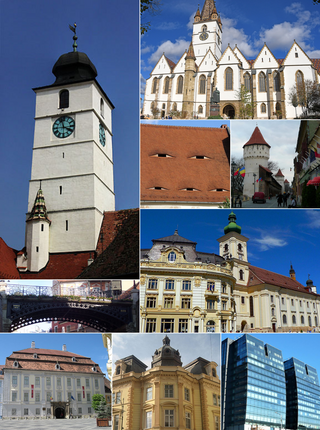
Sibiu is a city in central Romania, situated in the historical region of Transylvania. Located some 275 km (171 mi) north-west of Bucharest, the city straddles the Cibin River, a tributary of the Olt River. Now the seat of Sibiu County, between 1692 and 1791 and 1849–65 Sibiu was the capital of the Principality of Transylvania. Until 1876, the Hecht hause in Sibiu served as the seat of the Transylvanian Saxon University.
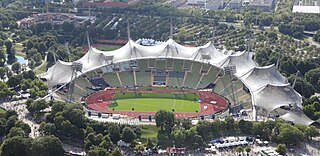
Olympiastadion is a stadium located in Munich, Germany. Situated at the heart of the Olympiapark München in northern Munich, the stadium was built as the main venue for the 1972 Summer Olympics.

The Aspen Music Festival and School (AMFS) is a classical music festival held annually in Aspen, Colorado.
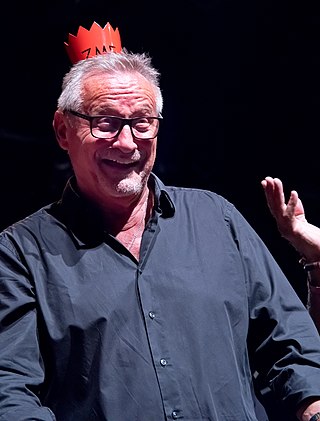
Konstantin Alexander Wecker is a German Liedermacher (singer-songwriter) who also works as a composer, author and actor.

The Public Theater is an arts organization in New York City. Founded by Joseph Papp, The Public Theater was originally the Shakespeare Workshop in 1954; its mission was to support emerging playwrights and performers. Its first production was the musical Hair in 1967. Since Papp, the theatre has been led by JoAnne Akalaitis (1991–1993), and George C. Wolfe (1993–2004), and is currently under Artistic Director Oskar Eustis and Executive Director Patrick Willingham.
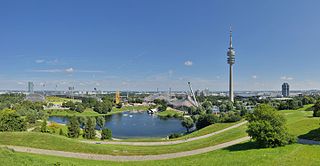
The Olympiapark in Munich, Germany, is an Olympic Park which was constructed for the 1972 Summer Olympics. Located in the Oberwiesenfeld neighborhood of Munich, the Park continues to serve as a venue for cultural, social, and religious events, such as events of worship. It includes a contemporary carillon. The Park is administered by Olympiapark München GmbH, a holding company fully owned by the state capital of Munich. The Olympic Park Munich was also considered to be an architectural marvel during the 1972 Olympics in Munich, Germany.
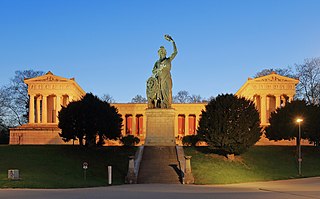
Theresienwiese is an open space in the Munich borough of Ludwigsvorstadt-Isarvorstadt. It serves as the official ground of the Munich Oktoberfest. A space of 420,000 square metres (4,500,000 sq ft), it is bordered in the west by the Ruhmeshalle and the Bavaria statue, symbolizing the State of Bavaria, and in the east by Esperantoplatz, a square named for the international language Esperanto. There, a memorial commemorates the victims of the 1980 Oktoberfest bombing. Bavariaring, an orbital road, provides access to visiting traffic. In the north the towers of the Paulskirche are visible.

Oktoberfest is the world's largest Volksfest, featuring a beer festival and a travelling carnival, and is held annually in Munich, Bavaria, from mid- or late-September to the first Sunday in October. The annual event attracts more than seven million international and national visitors at its peak. Locally, it is called d'Wiesn, after the colloquial name for the fairgrounds, Theresienwiese. Oktoberfest is an important part of local culture, having been held since the year 1810. Other cities across the world also hold Oktoberfest celebrations that are modeled after the original Munich event.

Bermudadreieck or Bermuda3Eck is the designation for an area in the center of Bochum, Germany, with a high density of bars and restaurants, bounded by the streets Südring, Brüderstraße, Kortumstraße and Viktoriastraße. The number of gastronomic establishments has increased since the beginning of the 1980s, spurred by the short distance to the Bochum Theater, Union Theater and the main train station. It is served by Engelbert-Brunnen/Bermudadreieck U-Straßenbahn Station, on lines 308 & 318.

The 2012 UEFA Champions League final was an association football match which took place on Saturday, 19 May 2012 between Bayern Munich of Germany and Chelsea of England at the Allianz Arena in Munich, Germany. The match was to decide the winner of the 2011–12 season of the UEFA Champions League, Europe's premier club football tournament. Bayern were making their ninth appearance in the competition's final, having won four and lost four, most recently losing in 2010. Chelsea were appearing in their second final, having lost their first in 2008.

For the 1972 Summer Olympics, a total of thirty-two sports venues were used. A majority of the venues used were new construction in time for the 1972 Games after Munich was awarded the Games in 1966. Kiel Bay was the only venue from the 1936 Summer Olympics to be used for the 1972 Games. A stretch of the Autobahn near Munich was used for cycling's road team time trial event. After the Olympics, Olympiastadion hosted the final of the FIFA World Cup less than two years later. Augsburg's Eiskanal has served as host to three Canoe Slalom World Championships while the shooting range hosted the World Shooting Championships 2010. Olympiapark was part of Munich's bid for the 2018 Winter Olympics.

Neuhausen-Nymphenburg is a borough of Munich, the capital of the German state of Bavaria. It was created from the merger of the former boroughs of Neuhausen and Nymphenburg in 1992.
The Theaterfestival Spielart is an international theatre festival which takes place every two years during November and December in Munich, starting in 1995. The festival lasts between 15 and 17 days. Guests usually include over 20 international theater and performance groups.
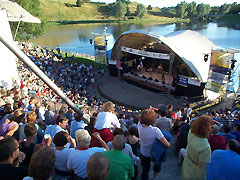
The admission-free music festival in Munich was first held in the early 1970s and attracts more than 100,000 visitors annually. With the "MusicSommer" program in August 2000, the event achieved an entry in the 2002 Guinness World Records as the "longest continuous music open air festival in the world".
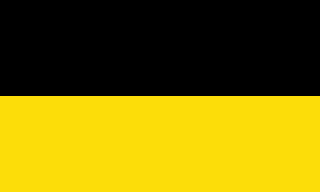
The following outline is provided as an overview of and topical guide to Munich:
SAP Garden is a 12,500-seat indoor arena, in Olympiapark, Munich. The arena was completed in summer 2024 and it will be ready for use for the 2024/25 season. The site was built at the location of the former Radstadion which was demolished in 2015. It is the home rink to ice hockey team EHC Red Bull Munich and home court to basketball team Bayern Munich.

The Theater Trier is the municipal theatre of Trier, Rhineland-Palatinate, offering opera and musical, dance and drama. The company dates back to 1802. The current house was completed in 1964, and needs renovation. The director since 2018 is Manfred Rolf Langner.